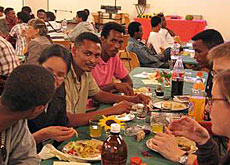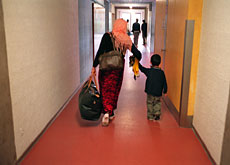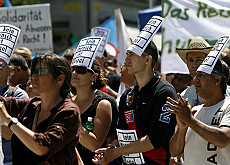Eritrean asylum seekers face uncertain future

Eritreans fleeing the army have come under the spotlight after Swiss Justice Minister Christoph Blocher called for tougher measures against deserters seeking asylum.
People from Eritrea currently top the list for asylum applications. They accounted for more than 14 per cent of all asylum applications in the first nine months of 2007.
Blocher told the media earlier this week that Switzerland’s generosity in granting deserters and contentious objectors refugee status had made it a target for Eritreans fleeing their homeland.
Eritrea is in involved in an ongoing border dispute with its neighbour Ethiopia, and men and women are liable for conscription into the tightly controlled Eritrean army.
Blocher – who is a leading figure in the rightwing Swiss People’s Party – wants to tighten Swiss law to ensure that army desertion is no longer a valid reason for granting asylum.
However, the non-governmental organisation Swiss Refugee Council disputes the minister’s reasoning.
It says the Swiss Asylum Appeal Commission decided two years ago that Eritreans who faced torture if sent home should be recognised as refugees. It is generally accepted that many will face such treatment upon their return.
The Council points out that refusing to serve in the army has in itself never been grounds for granting refugee status.
“What is certain is that Switzerland must give provisional admission to these deserters if they are at risk of torture or serious maltreatment,” Council spokesman Yann Golay told swissinfo.
Situation of conscripts
Many human rights organisations, including Amnesty International and Freedom House, have detailed the situation of conscripts in Eritrea.
Conscription is universal; in theory it lasts 18 months, but the practice is different, they say.
Many conscripts have been kept in service indefinitely and security forces periodically round up thousands of suspected draft dodgers. Family members of deserters have been obliged to put up large bonds, or have been imprisoned to oblige their relatives to report for duty, say the organisations.
According to Amnesty International, asylum seekers sent back to Eritrea from Malta in 2002 were tortured on their return.
For her part, Regula Fiechter, from the Catholic charity Caritas, which has helped many Eritrean asylum seekers submit their applications to the Swiss authorities, disputes the view that many Eirtreans target Switzerland in particular.
While it is true that many of them want to join family members already in the country, others do not want to come to Switzerland at all, she explained. Many are simply in the hands of people smugglers, she said.
Switzerland – a target?
The Federal Migration Office has a different interpretation.
“The people smugglers are well informed about what’s available in different countries,” Jonas Montani, an office spokesman, told swissinfo. “If you grant people refugee status, this acts as a pull factor.”
Refugees in Switzerland are given so-called B-residence permits. Although they must be renewed annually, after a certain number of years the permit can be converted to one that allows the holder to stay indefinitely. A provisional status is much more precarious.
“Where someone is accepted provisionally, we can keep checking if the situation in the country of origin has changed,” said Montani.
Currently around 2,500 Eritreans live in Switzerland. Caritas’ Fiechter says they are mostly highly disciplined, very keen to learn the language and to integrate.
“We are looking for peace, security and education,” a young Eritrean told a gathering organised by a support group in the northern town of Aarau in September. “We don’t want to be a burden to anyone. We are not criminals, we want to work.”
swissinfo, Julia Slater
Eritrea gained independence from Ethiopia in 1993 after a long war. It is a one-party state, and its president, Isaias Afewerki, heads the party, the national legislature and the military.
An ongoing border dispute with Ethiopia, which started in 1998, has hindered the country’s development and has been used to justify restrictions of civil liberties, say NGOs.
In theory conscription lasts for 18 months, but in practice many people are kept in service for much longer. Tough measures are taken against deserters or their families if the conscripts fail to show up.
According to the Federal Migration Office, there has been an increase in the exodus of Eritreans in the last two years.
In the first 9 months of 2007 there were 1,095 applications for asylum by Eritreans.
In 2006 there were 1,201.

In compliance with the JTI standards
More: SWI swissinfo.ch certified by the Journalism Trust Initiative



You can find an overview of ongoing debates with our journalists here. Please join us!
If you want to start a conversation about a topic raised in this article or want to report factual errors, email us at english@swissinfo.ch.